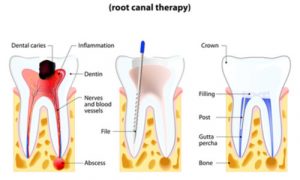Do you have sensitive teeth after root canal? Do you think this condition should worry you? This article can help us understand whether we have to worry about it or not. If you are looking for a holistic approach to dental care, read more at https://www.stleonardsdental.com.au.
Things to know about root canal
Is it normal to get sensitive teeth after root canal procedure? Before we answer this question, let us know first some details about root canal treatment. We’ll see how this dental procedure takes place as well.

Root canal treatment is the procedure involving the removal of infection inside your teeth. Meanwhile, the term “root canal” is a part of the tooth. You can find the nerve tissue, blood vessels, and other cells known as pulp in this hollow section.
The pulp is the part of the tooth inside the root canal that serves as the source of the tooth’s nourishment. Additionally, it provides moisture to the tooth’s surrounding materials. Meanwhile, the nerves in the pulp consider the exposure to hot and cold temperatures as pain.
The treatment’s medical term is endodontic therapy, which means “inside the tooth”. However, medical practitioners are more accustomed to referring to it with a root canal. When you undergo root canal therapy, you will utmostly undergo three steps in one session.
- First and foremost, the dentist will apply local anesthesia. Afterwards, the dentist will clean the root canal and have to remove everything inside it. Through a small hole, they will start removing the damaged and dead parts of the pulp tissue.
- After decontaminating the root canal, the dentist will fill it in with a rubber-like material to entirely seal the area. After this procedure, the treated tooth will be dead already. It can no longer feel pain because the dentist already removed its nerve tissues.
- After the process, the tooth will become more vulnerable. In this case, the patient should have a crown or filling to keep it protected. The patient has to wait for the dental crown or the filling to complete before chewing on it again.
Why would you need a root canal procedure?
In actuality, the procedure will only take within a single session. However, it will still depend on the actual condition of the root canal. If the issue is severe, the patient might need multiple dental appointments to complete the treatment.
Be that as it may, why do we need to undergo root canal treatment in the first place? To answer that, we have stated the typical reasons why dentists recommend this procedure to their patients.
- The pulp cannot repair itself once it incurs injury or damage. In this case, the tissue will die.
- Additionally, bacteria can quickly enter the pulp if you have a deep cavity, crack, or loose filling on your tooth.
- Once the bacteria penetrated the pulp, they will start causing damage. It can even lead to bone infection if not treated.
- An injured pulp will cause sensitivity as well.
- For the most part, the infection can spread to other parts of the body.
For these reasons, it would be best to consult your dentist if you need root canal therapy. Your tooth pain needs immediate dental treatment before it even worsens. Visit this page to read details.
Sensitive teeth after root canal
Your tooth pain should subside after a root canal treatment. However, there would be cases that you would have sensitive teeth after a root canal. On the other hand, this sensitivity should only last for a few days.
So, if the tooth pain or sensitivity lasts longer, there is a possibility of complications. For this reason, you have to return to your dentist to have it checked again. Otherwise, it can be more severe than the current condition. Here are a few reasons according to the PicNic Point Dental Care team why you might encounter persistent tooth pain or sensitive teeth after a root canal.
1. Bone infection
This situation can happen after root canal therapy if there are remaining bacteria in the bone around the root. In effect, it can still cause inflammation and pain. In this case, your dentist might prescribe antibiotics to quicken the treatment for the infection.
2. Root canal infection
It is possible to develop this after the procedure due to filling leaks. These leaks allow the bacteria present in the saliva to interact around the filling edges. In due time, it can reach the root canal as well.
3. Dental cement overfilling
This condition can happen when a small amount of cement reached the root tip. Even if the root tip may not get infected, the pain will still occur after a root canal treatment.
4. Large filling or crown
If the size of the filling or dental crown does not match the exact requirement, it can hit the opposite tooth. An adjustment is necessary to address the situation.
5. Sodium Hypochlorite leak
Sodium hypochlorite is necessary to wash the tooth roots. It enables to kill the bacteria, dissolve remaining nerve tissue, and washes accumulated slurry.
6. Overlooked infected root canal
There are several canals present in the teeth, and some are not easy to detect. In this case, there is a chance to miss out on an infected root canal.
What to do with sensitive teeth after root canal

As we mentioned, any pain or sensitivity after root canal therapy should only last a few days. During this period, you can still manage it at home. Your dentist is very much aware of this after-effect, so they are most likely to prescribe you over-the-counter pain relievers.
These over-the-counter pain relievers should be sufficient to work out your pain after root canal treatment. However, you should follow the instructions from your dentist when taking medications. And if any of these pain relievers won’t work, you have to seek help from your dentist.
Final thoughts
Undergoing any dental procedure can have after-effects. For this reason, it is necessary to maintain open communication with your dentist. This way, you would know the appropriate action to take for the situation.
